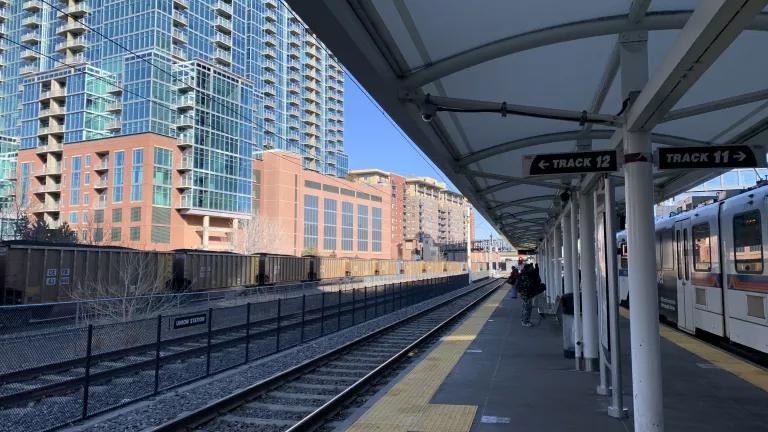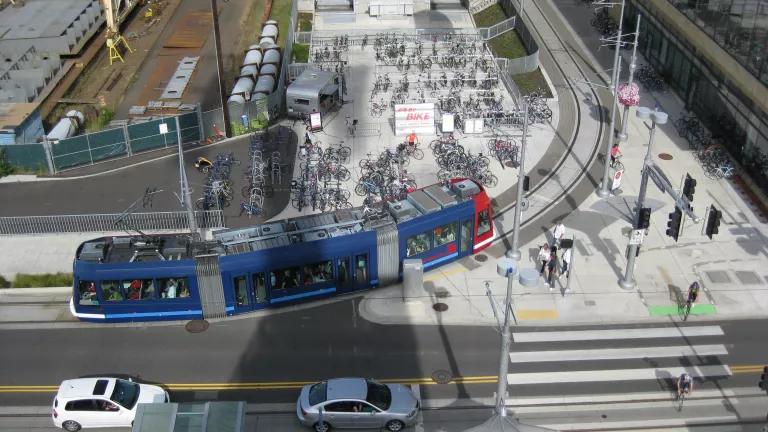American Cities Climate Challenge: A Look Back at Transportation
The Climate Challenge demonstrated just how much progress cities can make when they dedicate time and attention to deliver on their climate and equity commitments in partnership with non-governmental stakeholders.

As part of the Bloomberg Philanthropies American Cities Climate Challenge (Climate Challenge), which took place between early 2019 and summer 2022, 25 ambitious cities deepened and accelerated their efforts to tackle climate change and promote a sustainable future for their residents.
Each mayor from the participating 25 cities received a unique support package to help achieve their climate-related goals within the transportation, buildings, and energy sectors. This included several support options such as access to data; strategic campaign and communications support; funding for local community engagement; dedicated technical support and project management; augmented capacity through full-time staff; and peer support on best practices and lessons learned across the network.
The Climate Challenge demonstrated just how much progress cities can make when they dedicate time and attention to delivering on their climate and equity commitments in partnership with nongovernmental stakeholders.
Transportation guiding principles and strategies
The overall goal of the transportation program within the Climate Challenge was to decrease carbon emissions by reducing automobile trips and promoting vehicle electrification. To achieve these goals, local transportation efforts focused on improving transit, rethinking street design, reevaluating parking policies, and facilitating vehicle electrification, all while incorporating community needs and considering public health, safety, and environmental impacts.
Further, many of the Climate Challenge transportation team’s successes were made possible through a thoughtful equity-centered approach. The Climate Challenge team partnered with community groups whenever possible to better understand local conditions, address identified challenges, and co-create solutions to achieve results that directly benefit and uplift communities that have been historically marginalized. For example, in Cincinnati, the Climate Challenge partnered with minority and women-led firms to do grassroots engagement in support of their successful transit funding ballot measure. In Portland, Oregon, the Climate Challenge supported the creation of an equity-centered task force focused on congestion pricing policy development, composed of a 20-person panel of diverse community representatives who advise on the topic. The Climate Challenge network supported many other cities in successfully centering equity and environmental justice in their transportation planning efforts.
Climate Challenge partners
The Climate Challenge was made possible by a coalition of diverse partner organizations. The key transportation-focused national partners included:
- Electrification Coalition
- EVHybridNoire
- Forth
- Greenlining
- National Association of City Transportation Officials (NACTO)
- Nelson\Nygaard
- Urban Land Institute (ULI)
Each partner played a unique role in supporting Climate Challenge cities’ transportation goals, such as advancing electrification efforts, creating street design blueprints for bus or bicycle lanes, providing research and education support, elevating equity, and offering implementation support. We are grateful for the coordinated effort across many organizations that was critical to achieving successful outcomes across all 25 cities.
Creating change and scaling impact

Throughout the Climate Challenge, each city achieved at least one major sustainable transportation win across a variety of topic areas. The graphic below and accompanying report summarize the impressive overall impact of the Climate Challenge and the transportation-specific achievements.

Learn more about some of these successful projects and programs through the links below!
- Public transit—building dedicated bus lanes and passing transit ballot measures:
- Portland Rose Lane project—developed tool kit and framework to implement a citywide network of bus priority routes (aka “Rose Lanes”)
- Cincinnati transit funding measure—supported campaign and grassroots engagement to raise county sales tax to fund transit and road improvements
- Bicycle/pedestrian networks—supporting Vision Zero policies and implementing bike networks:
- Atlanta Safe Streets for walking and biking—funded and partnered with local groups to engage communities authentically and inform Atlanta’s regional Vision Zero action plan
- San José 2025 Better Bike Plan—supported San José, California, in writing and developing its ambitious plan to make bicycling safe and convenient for all ages and abilities citywide
- Pricing and transportation demand management (TDM)—laying foundation for congestion charging and developing TDM programs:
- TDM Trends in Boston, Honolulu, San Diego, St. Paul, Minnesota, and more—created a TDM implementation guide based on lessons learned from working with Climate Challenge cities
- Electric fleets and infrastructure—support adoption of EV policies and expanding EV infrastructure:
- St. Paul Evie Carshare—led and supported the creation and implementation of St. Paul’s network of renewably powered curbside EV charging locations
- Pittsburgh EV Readiness Ordinance—provided technical assistance to develop ordinance to increase the number of charging locations citywide
- Charlotte electric bus pilot—supported the development of the pilot program to test battery-powered electric buses
- Transportation/land use planning—assisting long-range land use/transportation plans and transit-oriented development (TOD) policies:
- Indianapolis TOD ordinance—helped develop and garner support for zoning ordinance to support TOD and improve walkability, housing diversity, and connectivity along bus rapid transit lines
Conclusion
After almost four years, the American Cities Climate Challenge ended in June 2022. Through the cities’ hard work and participation in this program, they demonstrated that ambitious climate action is not only possible but can also meaningfully improve people’s lives across the country.
Cities can and should be at the forefront of transportation progress, and the incredible work achieved as part of the Climate Challenge has proven how critical cities are to tackling urgent global issues like climate change. We are grateful for the participation of each city and the support of our partner organizations in the Climate Challenge in advancing climate solutions.




